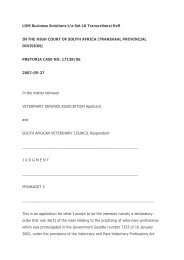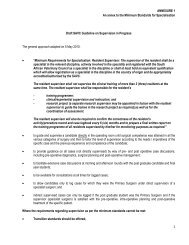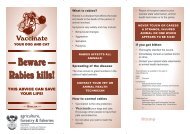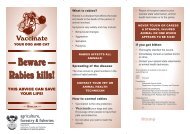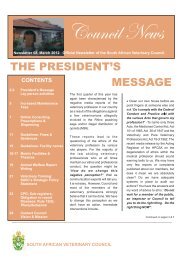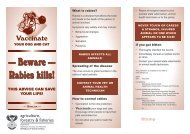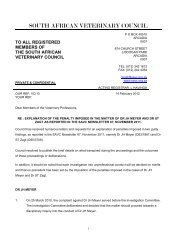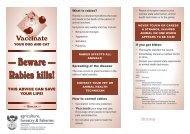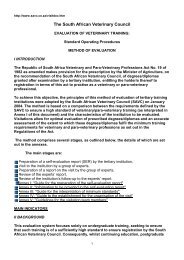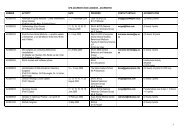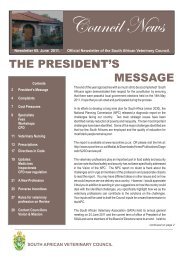Rabies Guide 2010.pdf - the South African Veterinary Council
Rabies Guide 2010.pdf - the South African Veterinary Council
Rabies Guide 2010.pdf - the South African Veterinary Council
You also want an ePaper? Increase the reach of your titles
YUMPU automatically turns print PDFs into web optimized ePapers that Google loves.
“All dogs and cats in <strong>the</strong><br />
Republic shall be immunised<br />
with an efficient remedy by<br />
an officer, veterinarian or<br />
authorised person at <strong>the</strong> age<br />
of three months followed<br />
by a second vaccination<br />
within 12 months, at<br />
least 30 days after <strong>the</strong> first<br />
vaccination and <strong>the</strong>reafter<br />
every three years. Dogs and<br />
cats younger than three<br />
months may be vaccinated<br />
provided that <strong>the</strong>y are again<br />
vaccinated at <strong>the</strong> age of<br />
three months, followed by a<br />
third vaccination within 12<br />
months and <strong>the</strong>reafter every<br />
three years.”<br />
The administration of vaccine before three months of<br />
age is justified by <strong>the</strong> incidence of rabies in puppies<br />
in <strong>South</strong> Africa. The Sou<strong>the</strong>rn and Eastern <strong>African</strong><br />
<strong>Rabies</strong> Group agreed at <strong>the</strong>ir conference in Nairobi in<br />
1997, that <strong>the</strong>re was no age below which vaccination<br />
of a dog against rabies would not be effective.<br />
There are definite benefits in vaccinating very young<br />
puppies, especially in areas of high prevalence where<br />
<strong>the</strong> chances that <strong>the</strong> dog will not present again for<br />
vaccination are high. As vaccine coverage is low<br />
in many dog populations, it can be assumed that<br />
few puppies will have significant passive protective<br />
neutralising antibodies to reduce <strong>the</strong> efficacy of<br />
vaccination.<br />
During a mass vaccination campaign in Tunisia<br />
puppies less than three months of age responded to<br />
vaccination with no significant interference by passive<br />
maternal immunity. 152 Dogs of all ages, even those<br />
less than three months of age, should be included in<br />
rabies mass vaccination campaigns.<br />
All dogs and cats regardless of <strong>the</strong>ir age, weight<br />
or pregnancy may safely be vaccinated. <strong>Rabies</strong><br />
vaccines may be safely administered on <strong>the</strong>ir own or<br />
toge<strong>the</strong>r with canine distemper, adenovirus type 2,<br />
parainfluenza, leptospirosis and parvovirus vaccines.<br />
It is usually not economically feasible to vaccinate<br />
all livestock against rabies. However, consideration<br />
should be given to vaccinating livestock that are<br />
particularly valuable, kept in areas of high-risk or<br />
during focal epidemics caused by black-backed jackal.<br />
Wild mammals kept as pets should probably be<br />
vaccinated annually, although trials have not been<br />
performed in <strong>the</strong>se species to determine vaccine<br />
efficacy or <strong>the</strong> ideal vaccination schedule.<br />
All parenteral rabies vaccines registered in <strong>South</strong><br />
Africa must be inactivated and induce at least three<br />
years protection following primary vaccination.<br />
Interprovincial movement<br />
restrictions<br />
As <strong>South</strong> Africa in its entirety is considered a rabies<br />
endemic area, all interprovincial movements of dogs<br />
and cats must be accompanied by a valid rabies<br />
vaccination certificate.<br />
Puppies and kittens less than three months of age<br />
may be vaccinated at weaning and can <strong>the</strong>n be<br />
moved immediately to any destination in <strong>the</strong> country<br />
provided that <strong>the</strong>y are revaccinated at three months<br />
of age. The rabies vaccination certificate of an<br />
appropriately vaccinated dog or cat is valid for three<br />
years in <strong>South</strong> Africa.<br />
All carnivorous wild animal species, including jackal,<br />
mongoose, bat-eared fox, wild dog, lion, leopard,<br />
cheetah and hyena must be vaccinated against rabies<br />
with an inactivated vaccine before being moved<br />
anywhere in <strong>South</strong> Africa and all movements must be<br />
accompanied by a valid rabies vaccination certificate.<br />
Export from <strong>South</strong> Africa<br />
The Department of Agriculture’s veterinary health<br />
certificate must be completed for international<br />
movements (Fig. 8). All vaccinations performed for<br />
international movements may only be carried out<br />
by an authorised person using a registered vaccine.<br />
When this certificate is completed by a registered<br />
private practitioner, it must be endorsed by a state<br />
veterinarian.<br />
48



